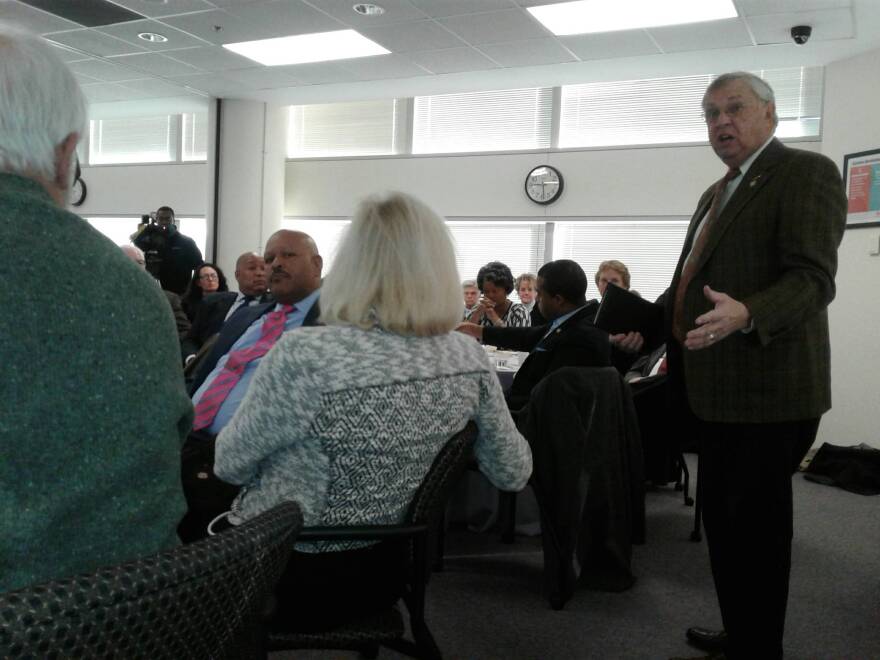CMS officials met with the local delegation of state lawmakers Thursday and it was testy at times. The discussion centered on legislation lawmakers approved that would reduce class sizes for students in kindergarten through third grade; and a bill being considered that would allow the towns of Mint Hill and Matthews to use property taxes to run their own charter school.
Mark Rumsey: Joining me is WFAE’s Gwendolyn Glenn. Gwen, the reduced class size issue has been a point of contention for school districts for more than a year now. How does the law change things and why are school officials opposed to it?

Gwendolyn Glenn: Mark, currently class sizes for kindergarten through third grades can have up to 24 students, but in the 2018/19 school year, that number will be reduced to a maximum of 18 students for kindergarten, 16 for first grade and 17 for second and third grades. That seems like a good thing and CMS officials say they believe the legislation was well intentioned but they weren’t given enough money by the state to pay for the additional teachers and classrooms that will be needed. Here’s Superintendent Wilcox.
"I need to find almost 450 teachers next year that I don’t currently have in the system," Wilcox said. "So my sense will be that we’ll have to reassign some teachers at the secondary level and we’ll let middle school and high school class sizes swell. We’re already in some algebra classes 40 to one."
GG: Mark, Wilcox says the additional teachers will cost the district $23 million and that they need another $20 million to purchase 200 trailers for additional classrooms.
MR: Did the district give any other options?
GG: They did but they said they were all bad options. One was to cut classes like P.E, arts and foreign languages. Schools have some flexibility with the funding they get for k-3 teachers right now and they may use some of that money to pay for teachers in these areas. Wilcox says he will not recommend that the school board eliminate those types of courses. School board president Mary McCray agreed that they are too important to cut. Another option was to eliminate the 180 pre-K classrooms in CMS schools and use those for additional k-3 classrooms. McCray says this would be a bad move considering that the state, county and district officials are pushing for increased pre-k classes to reach students earlier.
MR: How did legislators respond?
GG: No one spoke up in favor of this law. Republican Rep. Craig Horn of Union County, who co-chairs the House k-12 budget committee says he is working with colleagues to fix the bill. Getting changes pass the Senate is the challenge, here’s Horn.
"There is work being done now in the legislature looking at data to get a reasonable option. All is not lost but we won’t come up with a perfect answer," Horn said. "We need to work together and I firmly believe we will resolve this, maybe not in January. It won’t get done if you take the pressure off of us."
GG: School officials want legislators to fix the legislation this month in case they don’t come back in session until May, when the district’s budget is due.
MR: Let’s shift to the other contentious topic, the Mint Hill/Matthews charter school issue
GG: Yes, legislation being considered by the Senate that passed the House would allow officials there to use property taxes to fund and operate a charter school that gives priority to their residents. This would be a first in the state and CMS officials say it would segregate the district even more than it is now. Here’s school board President Mary McCray.

"Matthews is 78 percent white and 9 percent black and the other is spread between Hispanic and Asian. Only 500 of their kids will be served and who gets to choose those 500 kids and will any of those kids be kids of color or kids of poverty," McCray said.
MR: What was lawmaker’s response to that?
GG: Bill Brawley who represents that area in the General Assembly did not take kindly to criticism of the legislation. He sponsored the legislation.
"Is this a plot to re-segregate CMS schools, no, it is the parents of the kids in Matthews saying we no longer having faith that CMS will provide an adequate education for our children and we want an adequate education. The fact that they don’t trust you to educate their children should concern you more than this bill," Brawley said.
MR: So where do things stand now?
GG: This is the first time that CMS officials have met on their own with legislators like this. In the past they’ve piggy backed on city and county events. They say they will meet again in about six weeks to continue the conversation. Wilcox who joined the district this fall said he was surprised to feel the animosity that existed between the legislature and CMS and that he will work to improve their relationship.
Correction: A previous version of this story mentioned the measure reducing class size was passed last April. In fact, it was part of a budget bill that originally mandated the smaller class sizes to start in the fall of 2017. A bill passed last April delayed the start of that to the fall of 2018.


